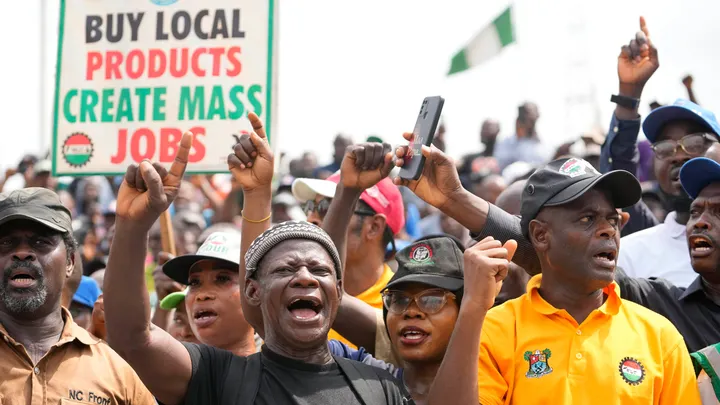In the heart of Africa’s most populous nation, Nigeria, a new wave of labor strikes has commenced, casting a shadow over the country’s struggling economy. As inflation rates soar to nearly 30%, government employees and union workers across the nation have halted work, demanding action against the economic downturn. The strikes, which began on Tuesday, aim to draw attention to the severe financial challenges faced by Nigerians, including the drastic increase in living costs and a significant devaluation of the naira.
Nigeria’s economy has been on a downward spiral, with inflation hitting unprecedented levels not seen in nearly three decades. The National Bureau of Statistics reported a staggering inflation rate close to 30% last month, underscoring the dire financial straits facing the populace. This economic hardship comes from President Bola Tinubu’s controversial policies, such as eliminating fuel subsidies and unifying the country’s multiple exchange rates, leading to a devaluation of the naira against the dollar.
The impact of these policies is palpable on the streets of Nigeria, where gasoline prices have more than doubled, exacerbating the cost of living for its citizens. “We are hungry. Nobody doesn’t know this,” exclaimed Joe Ajaero, president of the Nigerian Labor Congress, highlighting the desperation among the populace. Shop owners like Christian Omeje from Abuja voice their frustrations, too, noting, “Things are getting out of hand… Prices keep soaring, and the aid the government said it would dole out has not been provided.”
Despite previous strike actions in October, where government labor unions agreed with the government for monthly stipends and subsidies to alleviate the impact of the new policies, discontent persists. Unions argue that the government has reneged on its promises, including wage increases and support for vulnerable households, further fueling the unrest.
As Nigeria grapples with this latest strike, the resilience of its citizens and labor unions sends a clear message to the government about the urgent need for viable solutions to the economic crisis. While most services continue with a reduced workforce, the persistent strikes underscore a deep-seated frustration with policies perceived as detrimental to the welfare of the Nigerian people. The government’s next steps are crucial in addressing the grievances of its workforce and steering the country towards economic stability and growth.







